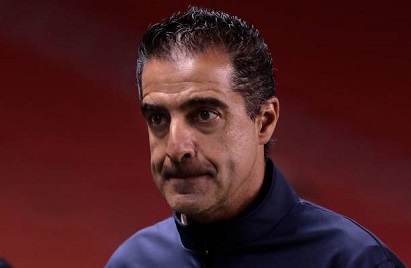 Renato Paiva spent 18 years as an academy coach at Benfica, rising through youth levels ranging from u14s, u17s and u19s before ultimately taking charge of the club’s B team. His spell at Estádio da Luz came to an end last winter when he decided to make the step into senior management as a head coach.
Renato Paiva spent 18 years as an academy coach at Benfica, rising through youth levels ranging from u14s, u17s and u19s before ultimately taking charge of the club’s B team. His spell at Estádio da Luz came to an end last winter when he decided to make the step into senior management as a head coach.
Like many of his countrymen, Paiva opted to venture abroad, but his decision to join Independiente del Valle in Ecuador represented a unique adventure for the Castelo Branco native. In an extended interview with Zerozero, the Portuguese spoke in fascinating detail about his experiences in Sangolquí based in the suburbs of Quito, as well as reflecting on his time nurturing some of Benfica’s biggest talents.
Paiva left Benfica on Christmas Day in 2020, with his departure coming amid frustration at not being assigned more responsibility at first-team level. He had replaced Bruno Lage as B team boss in the Liga Portugal 2 in January 2019, but when Lage was dismissed Paiva felt club president Luis Filipe Vieira reneged on a promise to entrust him with first-team affairs even for the shortest of periods.
“When Rui Vitória left Benfica, Bruno Lage was on the B team and he was the right replacement,” Paiva recalled. “I went to the B team. I had incredibly good proposals to leave, but the president would not let me leave because I had a contract and he projected that it would be me after Bruno Lage.
“By the time Bruno left, I already knew it would be Jorge Jesus, but what hurt me was the time between Bruno Lage leaving and Jorge Jesus arriving. We had a Portuguese Cup final and there were things to play for. The choice was Nélson Veríssimo, which is fine. This is absolutely nothing against Nelson Veríssimo, because he did an excellent job and is doing an excellent job in the B team.
“It's just that the president had talked to me about replacing Bruno. I didn’t leave the club because of it, and I ended up not being considered. It hurt. I felt that at that time someone with Jorge Jesus' status had to come and was needed, because Benfica wasn't doing well. But even if it was a week of training, before Jorge Jesus arrived, I should have got it.
“I then spoke to the president. From that moment on, the first proposal that appeared which interested me, even though I was under contract, they needed to have the sensitivity to let me leave because I deserved it. When the opportunity for Independiente arose, the president let me leave. We still talk today, and we have a great relationship.”
Ecuador came calling
The call came late last year, with Independiente looking for a replacement after Spanish boss Miguel Angel Ramirez departed. An emerging force in Ecuador, Independiente won the Copa Sudamericana under Ramirez in 2019 and were Copa Libertadores finalists in 2016, although they have yet to win the Ecuadorian championship.
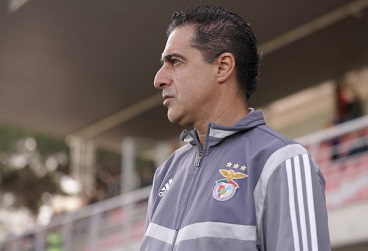 “It was 18 years in the house of my heart [Benfica], years of great learning, growth and emotion, but I felt that I needed something more to prove myself and test myself,” he says. “After you get to the B team it becomes more difficult. I wanted new challenges and to test myself in professional football. This opportunity was fantastic in timing.
“It was 18 years in the house of my heart [Benfica], years of great learning, growth and emotion, but I felt that I needed something more to prove myself and test myself,” he says. “After you get to the B team it becomes more difficult. I wanted new challenges and to test myself in professional football. This opportunity was fantastic in timing.
“As I was told, this is the most European club in South America and it really confirms itself in terms of philosophy and mentality. The directors have an impeccable philosophy, and everything revolves around that philosophy. I'm in love with what I'm doing here. Then there is the attraction of stumbling into history, which is the fact that this club has never been national champion. It’s a rarity for a club to have won an international trophy but not a national one.”
As he approaches a year in the job, things have been on an upward curve for Paiva, whose team sit top of the second phase of the Serie A championship. In Ecuador, the 2021 season is played in three stages: two round robin league tournaments to decide eventual finalists, who will meet to crown the overall champions at the end of the year.
“It could only be more positive if we had won the 1st phase of the Championship. But even so, with the team we had, going until the final two rounds with a chance of winning was very good. Now we are leaders since the first match of this 2nd round and I hope that it continues,” Paiva says, with his side three points clear at the top with just two rounds of the second phase remaining.
“To understand the equivalence, Independiente del Valle is similar to an SC Braga from Ecuador. Barcelona is Benfica, Liga de Quito is Sporting and Emelec is FC Porto. Then there is Independiente, a younger club, with fewer fans, smaller budget and less media attention. This gives even more value to what we are doing. A lot of people are excited about the possibility of playing the final with Emelec because we are swimming with the sharks and are doing a remarkable job.
“It is no coincidence that the two teams best positioned to go to the final, us and Emelec, are coached by European coaches (Ismael Rescalvo at Emelec). Europe's impact here is about tactics. In this league there is no doubt there is a lot of individual quality, technical ability, physicality. But then a low knowledge of the game.
“The Ecuadorian player with the ball limits himself and often doesn’t often choose to combine with teammates. Here they often play on their individual quality and opponent error. The fields and grass are terrible for the game idea we want, they are long and dry. The active play time is low, so even if teams go ahead after 15 minutes, they waste time.
“The club built a stadium during the pandemic, it must be a unique case in the world, and we are attentive to the grass, because we want to train as we play. However, playing away we always have this problem. As you know, the Portuguese coach has a great capacity to adapt and that is what we've been doing when going away and having this problem.
“One of the characteristics that brought me here was my history with development. This is, by far, one of the best academies in South America so the feature was a priority for me. What we did agree with the directors was that we would not fight the biggest clubs using just young players. In the first round of the championship, we lacked experience, we were the team that created the most, but also the one that wasted the most.
“That's why we made the directors see that it was important to take this step and create a strong mix between experience and youth. We never stopped looking to young people, but we needed more experience and quality. We brought Jonathan Bauman, who is the top scorer in the league now and many consider the favourite to be the best player in the league. But we never stop looking at the young players, who are the heart of the club. There are already kids from the B team training with us.
Club of the people
“We have a scouting network across the country. We have a school, a college with teachers. It is a really very European vision. Kids study here, graduate here, have prizes for best student. Ecuador is not a very developed country but there are several programs to educate the kids, namely in terms of Sex Education, because previously there were many who were parents at 16.
“The club is very civic-focused and even has a foundation. Recently, the club, players and technical team raised a sum and donated three houses to an extremely poor area near Colombia, to accommodate three families. We don't just worry about finding players. So, people get attached to the club. The club is young, it doesn't have a large number of supporters and that's how we gained supporters too.
 “When we reached the Libertadores final, for example, there was a violent earthquake in the country and the club filled the stadium and donated all the proceeds from three games to the victims. This marked a stage after which we became universally popular. It's kind of like everyone's second club, like Académica de Coimbra in Portugal [laughs].”
“When we reached the Libertadores final, for example, there was a violent earthquake in the country and the club filled the stadium and donated all the proceeds from three games to the victims. This marked a stage after which we became universally popular. It's kind of like everyone's second club, like Académica de Coimbra in Portugal [laughs].”
Off the pitch development is evident, but Paiva is also proving a shrewd appointment on the field. Indeed, praise from some of his most senior players is a source of pride for the 51-year-old, whose team lead the charts for best attack and best defence in the second phase of the championship.
“I did an interview recently and the journalist told me that Pellerano, 39 years old and with a long history at club level, and Bauman, 30, are learning things they had never learned before,” Paiva reveals. “I could already retire as a coach after hearing this. When you hear the player say this, it's amazing. When you’re able to add your detail without breaking the pace of training or upsetting the players, I have no doubts that all this detail makes the difference.
“This was a team which scored a lot of goals but also conceded a lot. They committed lots of players in attacks and could win 4-0 or draw 4-4. Our work was focusing on the defence, and this was new for them, and it gives us pleasure to look at Independiente's defensive line. Organising five players to a precise inch is very difficult.
“The perception of the game is more about results than what I was used to. We do not detract from our way of playing, but if it is necessary to close the game at 1-0, we close it at 1-0. In Benfica, this was not done so much. But I must adapt to this type of championship, with lots of breaks in the pace, lots of people wasting time, with horrible grass, where we need to be less romantic in the vision of the game and we cannot over-elaborate building the play from the back. We never forget what we want, but we're not going to start giving cigars to people, we just want to find the right solutions.”
Media bias
Paiva’s impressions are not all positive. A regular critic of the standard of officiating in the country, he has also encountered many obstacles in his attempts to put Independiente at the top table of Ecuadorian football. “We have come to eat other people’s cheese,” he jokes ahead of discussing some of the more challenging aspects of Ecuadorian football hierarchy.
“The refereeing is not good. There is no VAR, and I am sick of asking. It's not because there's corruption, but because the referees need more help. As I said, the Portuguese coach is the world champion in adapting and I had to adapt. I had a normal adaptation, gradual, with mistakes, with more right decisions than wrong ones, otherwise we wouldn’t be where we are.
“Here there is a problem that is clear. There are 16 teams that are against GolTV's editorial process. GolTV is headquartered in Guayaquil, where Emelec and Barcelona are located, and is the sponsorship partner of Barcelona. Imagine SportTV sponsoring Benfica, FC Porto or Sporting. I would not mind them sponsoring them as long as the editorial criteria was exempt, but it is not. It is a priority for me to defend Independiente del Valle and when these guys aren't doing it, I'm the first to speak.
“Of course, this led to a reaction. My daughter says, and it is true, that since this started, GolTV stopped showing me during the games. My daughter says: "oh dad, they film the other coaches and barely film you!". I replied that this was an advantage. If I were pretty, it would be bad, but ugly as I am it is an advantage [laughs].
“But I'm not alone in this. 16 of the 18 clubs signed a statement criticising this situation and only Emelec and Barcelona did not sign. When we played away at Barcelona, we had a fantastic game where we were winning 2-0 and, in the end, they drew 2-2 with a penalty. At the end, the Man of the Match was one of theirs, when a player of mine made a goal and an assist. The comments were as if Independiente hadn't played, I said what was in my soul and started making friends that day.
“Now, in a game with Emelec, there was a throw-in for them next to me and their winger came over to take the throw, he congratulated me for having the courage to say what no one says. But this is just with GolTV, with the rest of the press my relationship is fantastic. In fact, journalists themselves like me to say this, because I'm putting my finger on a wound. It created a wave of admiration and had a great impact, which was not my goal. Suddenly the president of Liga de Quito is agreeing with me and criticizing GolTV. It created a shock wave and I suddenly found myself being praised by the population.
“I get along very well with everyone, but I informed my press officer that I don’t speak to GolTV. If I have to it will be something pretty quick [laughs]. I don't like injustice, especially as I have a journalist daughter to whom I tell every day that as a professional, neutrality should be a priority. If one day she has to say that her father is going to be fired because his team doesn't play well, she will have to say so. I’m like that, because my father fought against Salazar's dictatorship as a writer, was persecuted by censorship and taught me to be like that. It's the best tribute I can pay him in life, because he's still alive, to be upfront, be respectful.”
Emelec won the opening phase championship, meaning should Independiente win the second phase and book their place in the final, the two would meet next month to declare the overall winners. For Paiva, focus is beginning to switch towards keeping the club grounded as excitement over making history builds.
“They ask me about the final, but I'm trying to curb euphoria, because you go from everything or nothing or from nothing to everything in an instant. My message is to understand who we are, what we are doing, what our past is and how we can change it. People started talking about the final five or six matches ago because we’ve been top since the start. Even to directors I always say to take it easy. We have a game with Emelec where anything can happen.
“I tell everyone that it is possible, and that we feel we are doing everything to make it possible, but that in football anything can happen. I have seen Manchester United become European champions in two minutes when they were losing to Bayern. I have seen so much. I keep my feet on the ground, and I try to make others with us do the same. The players feel prepared.
“I will do everything, so that on December 12, I can show the Portuguese flag, because it would mean that we had won the championship. We want to display it with pride and when we left Portugal, we felt this weight and this responsibility to represent the diaspora of Portuguese coaches who work abroad and are successful. We don't want to fail, because we want to be one more to leave the Portuguese coach's imprint.”
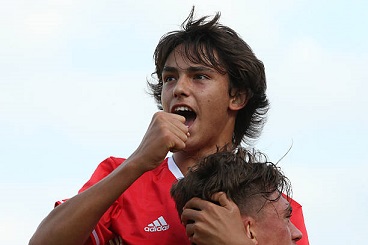 Changes at Seixal
Changes at Seixal
Switching the topic back to Benfica, where Paiva spent almost two decades developing players such as Bernardo Silva, Rúben Dias, João Felix and Renato Sanches, the interview focused on some of the major changes he has seen at the club during his long tenure.
“The model changed from from "results" to training players,” he states. “The priority changed. Before it was to win and the best players in each tier were developing in that tier, even if they were scoring ten goals per game. The theme was winning. There was a battle between coaches and management to understand that the best players in each tier must be moved to the level above.
“They have to be at a level where they are put to the test. Before that the players would reach the second half of the season and have difficulties because it was too easy for them, so they didn't evolve. Player development is more important. When the B team started giving kids the chance to play professionally it was a fundamental step. That's what gave rise to the tremendous evolution and quality of the players, allied to the coaches at Seixal who are of extremely high quality, not only for the individual development of the kids, but also for the way the teams play.
“Where it hurts the most is with defenders, it's where the B teams suffer the most. Because in the youth sides 90% of the time they are attacking. It is constant attacking and occasionally focus on defending for the big games. We would do it in training, but it could not be put to the test much in games.
“When they get to the B team and go up against people in their late thirties, players who have played abroad and played against the big clubs – we played against Hugo Almeida! - then our defenders are not used to behaving as defenders. An Academica or a Feirense force you to defend. That was the big problem we were experiencing. The forwards and the wingers didn't have big problems, but the defenders and defensive midfielders suffered more.
“Let me give you an example: Tomás Tavares, who was treated as if the kid didn't know how to play football. He had defensive gaps, very normal! Why? He played just a couple of games for the B team, then he was in the senior team and thrown to the wolves defensively. 50 games [for the B team] would be the minimum. Bernardo Silva or João Félix are midfielders or forwards. But look at the case of Rúben Dias. How many games did he play in team B? Lindelof? Lindelof is still the player with the most games in Benfica's B team. These are processes without which the player pays.”
Paiva was then asked to give his opinion on some of the recent graduates from the Benfica academy, whose stories have yet to be defined. Paulo Bernardo, the 19-year-old midfielder who recently made his Eagles debut, is the first assessed by Paiva, who was the youngster’s coach when he signed his first professional contract in February 2018.
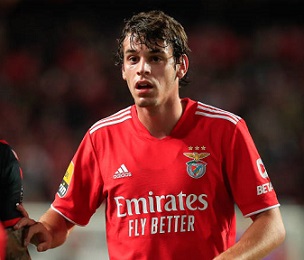 Paulo Bernardo:
Paulo Bernardo:
“Paulo has a beautiful history with us. He was identified at Benfica as an elite midfielder, but I told him there was a difference between an elite midfielder and a high-quality midfielder: scoring goals. If he didn't score goals, he would never become an elite midfielder. The truth is that Paulo, being the intelligent kid that he is, knew how to listen, be patient and work accordingly. I was still in the B team, and he started to score goals.
“Everyone looked at him as a 10 and he became an 8. He had defensive sacrifice. I left but I’m delighted whenever I see Paulo's goals, because I remembered this story and he knows it's true. Paulo played some B team games. Is it his time? The decision will always be up to whoever works with him. Jorge Jesus knows that in order to define the moment, we also must look at the context. If Paulo is better than the other options, it's up to the coach to decide.
“What I can assess is Paulo's potential and this is never-ending. And I said after leaving, Paulo is the future biggest sale of Benfica. I see Paulo, with respect and affection to everyone else, this way. I said this in the past about João Félix, and I just need to get it right in the fight for the Ballon d'Or, and now I'm saying this about Paulo. I feel he’s different. If he stays healthy, he will give a lot of sporting and financial income to Benfica.
“Besides the quality he has, one fundamental thing is the mental aspect at this stage. Paulo is a super reserved kid. I've already told him he must speak louder and more often, but I also think it helps him. He’s focused. On the field he changes, and his football speaks for him and he’s becoming a leader. But outside it he's a reserved kid, humble and very quiet, but focused on what he wants. He has everything to be an elite player, there are no extravagances or distractions. He’s highly intelligent, he knows what he wants, he knows how to listen, which is a great virtue. That's how he got to where he has and how I think he will get to where he’s going.”
Tomás Araújo:
“Tomás is an interesting one, he was seen as a prospect of the B team as a young boy. He is, together with Rúben Dias, the most complete centre-back that I have trained to date. He has everything, absolutely everything. At the same age he is technically superior to Rúben Dias in building the play, Rúben was a little more focused on working and his aggression. Tomás has everything. He is technically capable, can pass like a midfielder, doesn't panic at all with the ball at his feet, not even close to his goal line. Super-fast. He could be a little more focused and aggressive.
“Just like Paulo, I think he'll make it. I think he will be one of Benfica's top central defenders, now I don't know when. Benfica has a great coach to make these decisions and will certainly be on top of it, he even worked with him in the pre-season. In the future? I have zero doubts. He will be Benfica's main central defender if he is healthy and has no problems.”
Jota:
“Jota is more developed, but the great sin of his was the ‘child-like’ part of his game, which is less realistic in today’s football. Jota dribbled past a player and if he could, would wait to beat him two or three more times. Jota is one of the players with the best technical and tactical attributes we've seen, but he always had a very playful vision of the game. There was little seriousness in what the game asked for.
“It cost him. I've always said that when Jota took the maturity leap, not only in physical terms, but also in terms of game perception, when he started to use the countless technical and tactical attributes he has for the game and apply it effectively, he was going to blow up and be a serious prospect. It's happening now. And now more will happen because he's growing up and he's going to find it's working. He is super smart. As Jota grows as a person, he grows as a player.”
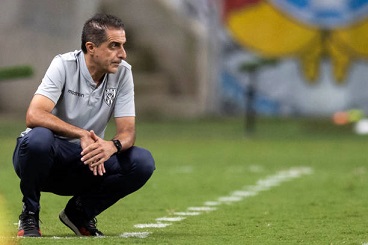 Benfica the "lifelong dream"
Benfica the "lifelong dream"
So, what of Paiva’s own growth as a coach and his prospects? His strong performances in South America will not have gone unnoticed, but when discussing his future there is inevitably one club taking special significance in the conversation.
“It's the question I answer most in football and I always answer it the same way. We are super happy here. There was some heartache for leaving the club of my heart, but it was a decision that had to be more rational than emotional. If it were emotional, I would never have left Benfica. But it was rational, and it was the right decision.
“The future of a football coach is tomorrow's training, and I can’t look beyond it. Managers don’t have transfer windows; that's why it's said that the coach's suitcase is always ready and at the door. What I can say is that I have another year on my contract here, I'm super happy with what we're doing. The people responsible for the club are delighted with our work and so are the fans.
“I have already received approaches from Portugal. In Portugal, the project is to fire the coach after five rounds if he doesn't show results. These are not projects. Of course, I would never refuse a great club in Portugal. Despite being associated with Benfica, training any great club would always be attractive.
“Obviously, I would also accept the club of my heart. Benfica is a dream, but first they have a coach and second they have a great coach. If I ever could, it would be the dream of a lifetime.”
By Sean Gillen via zerozero.pt

